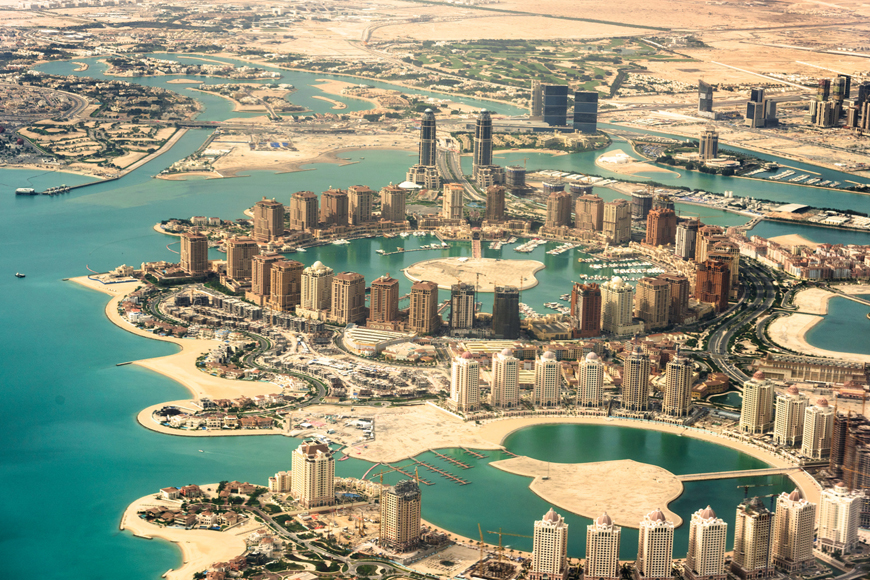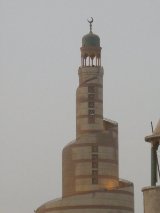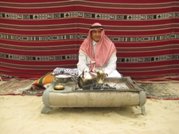23 January 2011
| Last updated on 11 December 2017
 Tell me about Qatar
Tell me about Qatar
Qatar is an independent and sovereign state, located half way down the west coast of the Arabian Gulf, occupying a small, thumb shaped peninsula measuring 11,437 square kilometres, and is slightly smaller than the state of Connecticut, USA.. Its capital city is Doha, and except for a relatively small land border with Saudi Arabia Qatar, it is predominantly surrounded by the Arabian Gulf. It boasts a coastline covering more than 700 km of generally shallow waters with many coves and inlets scattered along it.
The country is centrally placed among the states of the Gulf Cooperation Council (GCC), which  groups it with Saudi Arabia, Kuwait, Bahrain, Oman and the United Arab Emirates. The architecture is at times breathtaking and you will see a lot of amazing structures, designed in the Middle Eastern tradition.
groups it with Saudi Arabia, Kuwait, Bahrain, Oman and the United Arab Emirates. The architecture is at times breathtaking and you will see a lot of amazing structures, designed in the Middle Eastern tradition.
The terrain in Qatar is generally flat and rocky and covered with sand flats and dunes. However there are a variety of geographical marvels such as exceptionally elevated limestone formations, coastal salt plains, singing sand dunes. To the southeast lies the spectacular Khor al Adaid (‘Inland Sea’), an area of rolling sand dunes surrounding an inlet of the Arabian Gulf. This is a popular day trip destination and many people camp overnight here too.
The highest point in Qatar is Qurayn Abu al Bawl at 103 metres (338 ft) in the Jebel Dukhan to the west, a range of low limestone outcroppings running north-south from Zikrit through Umm Bab to the southern border. The Jebel Dukhan area also contains Qatar’s main onshore oil deposits, while the natural gas fields lie offshore, to the northwest of the peninsula.
It really is worth the journey so make sure you visit it and try and incorporate a ‘dune bashing’ trip too, where a 4x4 vehicle will take you on a roller coaster ride across the dunes!
trip too, where a 4x4 vehicle will take you on a roller coaster ride across the dunes!
Qatar has a number of beaches, however many are only accessible with a 4x4 vehicle or attached to hotels where you have to pay a membership for the use of the facilities. Not surprisingly the more secluded beaches do not have restaurants and toilet facilities attached to them so be prepared for this when you visit them. However this can be part of the charm, especially finding a gorgeous unspoiled beach and having it all to yourself for the day!
 For the most part, Qatar has arid conditions and its landscape primarily consists of sand dunes and rocky hills. Vegetation is sparse, if not totally absent but suddenly comes to life when it rains. Overnight the brown dry landscape turns green, with grass, lush shrubs and colourful flowers.
For the most part, Qatar has arid conditions and its landscape primarily consists of sand dunes and rocky hills. Vegetation is sparse, if not totally absent but suddenly comes to life when it rains. Overnight the brown dry landscape turns green, with grass, lush shrubs and colourful flowers.
The Arabian oryx roams the desert and is a protected species as well as Qatar’s national animal.
Although agriculture is very limited in this country, it does occur but is totally reliant on irrigation. There are many Date Palm ‘farms’ which mainly get water from underground wells. In the North Central part of Qatar, rainwater is collected through the drainage basins but most of the water comes from desalination plants.
The growth in population in Qatar has been phenomenal, in the 1960’s the population was 70,000, it is now currently estimated to be over 1,400,000. This number is predominantly made up of the expat community; of the 1,400,000 only around 350,000 are native Qataris. Approximately 50% of the population resides in Doha, which is the business and administrative capital of Qatar. There are other reasonably sized towns which include Masaieed and Al Wakra, in the south, Dukhan on the west coast, and Ras Laffan and the harbour town of Al Khor in the North of Qatar.
How hot?
There are mild winters and very hot, humid summers. The summer (which runs from May to September) typically brings intense heat, alternating between dryness and humidity. Temperatures are sometimes known to exceed 50°C, yes it’s true! The weather is much more agreeable from October to April and in fact ‘winter’ temperatures can fall to around 17° C, which after the summer can feel relatively cool.
Many of the local residents choose to travel in the hot summer months - the government has, however, initiated various attractions and activities encouraging people to stay during that hot period.
Rainfall is negligible, averaging approximately 100 millimetres per year, and is generally confined to the winter months (January and February). In 2008 it rained on only 2 days! The rain, when it comes does tends to fall either in small brief showers lasting only minutes or heavy showers that can last the day. Qatar is not equipped to cope with these longer heavier showers and when they come flooding is common on the roads.
Such limited natural fresh water resources mean increasing dependence on large scale desalination so bottled drinking water is recommended here.
Sand storms also occur in Qatar causing low visibility and major disruption on the roads. These can last for a few days and descend within minutes covering everything in layers of sand and making spending any period of time outside uncomfortable.
Average temperatures in Qatar
|
ºC
|
Jan
|
Feb
|
Mar
|
Apr
|
May
|
Jun
|
Jul
|
Aug
|
Sep
|
Oct
|
Nov
|
Dec
|
|
Max
|
28
|
29
|
32
|
38
|
39
|
40
|
43
|
43
|
38
|
35
|
33
|
28
|
|
Min
|
10
|
11
|
13
|
18
|
21
|
25
|
38
|
38
|
23
|
20
|
18
|
13
|
The rest is history
Qatar is a country rich in history and heritage, a former pearl fishing centre and once one of the  poorest Gulf States. Archaeological discoveries, inscriptions and artifacts prove that the land now known as Qatar was populated from around 4000 BC.
poorest Gulf States. Archaeological discoveries, inscriptions and artifacts prove that the land now known as Qatar was populated from around 4000 BC.
During the pre-Islamic era, it was mostly dominated by foreign powers, such as the Persian dynasties, then during the Islamic era Qatar was one of the first areas to convert to Islam.
Qatar remained quite independent during medieval times however races and ideas were introduced into the peninsula from Africa, South and Southeast Asia, as well as the Malay archipelago, as a result of Qatar’s participation in ocean commerce.
The British initially became interested in Qatar due to its location, which was a useful and significant vantage point en route to their colonial interests in India. However the British Empire’s dominance over Qatar diminished after the second world war, especially following Indian independence in 1947, and on 3rd September 1971 Qatar became an independent sovereign state, refusing to join the United Arab Emirates. The Emir, His Highness, Sheikh Hamad Bin Khalifa Al Thani, acceded to power on the 27th June 1995 after seizing control of the country in a bloodless coup whilst his father was on holiday in Switzerland. The Emir and his father are now reconciled.
On 5th August 2003, HH the Emir announced the appointment of his son, His Highness Sheikh Tamim Bin Hamad Al Thani as the Heir Apparent. The ruling Al Thani family was among a tribal group who settled for a long time at the 'Gibrin' oasis in the southern Najd, before their arrival in Qatar during the early 18th century. The name Al Thani is derived from that of the family's ancestor Sheik Thani Bin Mohamed Bin Thani, who was the first Sheikh to rule over modern Qatar during the mid 19th century. The family is a branch of the ancient Arab tribe, the Bani Tameem, whose descent, can be traced back to Mudar Bin Nizar.
Since his rise to power the Emir has introduced many liberal reforms such as press freedom, extended with the launch of the television news channel Al Jazeera, elections in 1999 (where Qatari women voted for the first time) and the drafting of a new constitution.
Language and Religion
The official language of the country is Arabic, but English is widely spoken and understood. All official documents (such as visas, resident permit applications and contracts) must be completed in Arabic.
In contrast with other Arab states such as Saudi Arabia, Qatar has comparatively liberal laws, for instance women can’t legally drive in Saudi Arabia but they can in Qatar. Alcohol is permitted in Qatar but is only available at the Qatar Distribution Center (QDC) or in licensed hotels or clubs. Expats that are not Muslim can obtain an alcohol permit that allows them to purchase alcohol at the QDC. Alcohol can only be purchased for personal consumption and you will only be permitted to spend an allotted percentage of your annual salary on alcohol. Although Qatar is seen as liberal in some aspects it is much less liberalised than the UAE or Bahrain. The government is cautious in its approach to liberalisation but there is a wind of change.
Islam is the official religion of the country and Shari’a (Islamic) Law is the principal source of legislation and this is applied to family law, inheritance and some criminal acts. The Qatari’s are very dedicated to upholding tradition and deeply religious and you will hear the call to prayers from every mosque five times a day. During this time many Muslims will stop whatever they are doing to go to the mosque or kneel to prayer wherever they are.
The official Currency is the Qatari Riyal (QR) which is divided into 100 Dirhams. The exchange rate is linked to the US Dollar at the fixed rate of US$1 = QR3.65
Attire
Qataris are very traditional, with the men wearing their national dress of a Thobe, which is a  long white garment worn usually with either a white, or red and white chequered head scarf. The women wear traditional black abayas and many cover their faces with a veil, others choose to just cover their hair.
long white garment worn usually with either a white, or red and white chequered head scarf. The women wear traditional black abayas and many cover their faces with a veil, others choose to just cover their hair.
What not to wear!
Qatar has quite liberal rules in regards to dress for expats and whilst they are not required to dress in traditional attire it is recommended that women cover their shoulders and knees and do not wear particularly tight or revealing clothing as a mark of respect. These rules become much more important during Ramadan and are enforced by special ‘clothes’ police that ensure ladies are covered appropriately. This is a very important month in the Islamic calendar and extra respect must be shown. You are also forbidden to eat or drink in public during Ramadan (with the exception of young children, pregnant and menstruating ladies, the elderly, the insane or the chronically ill).
In general, the Qatari Inhabitants are of Arabic origin and the culture is very much based on Islamic tradition. Islam is the dominant influence on day-to-day life. This rich cultural tradition is present in what they wear, eat and drink. Qataris are known for their generosity and friendliness, thus making Qatar a very welcoming country.
Pork is outlawed in Qatar and cannot be found anywhere- it is also illegal to bring it into the country. Muslims are forbidden to eat any meat that is not slaughtered in accordance to the Islamic code; this is referred to as halaal. Consumption of alcohol is frowned upon by Qataris.
From pearls to oil
Before the discovery of its vast natural oil and gas reserves Qatar’s economy was mostly dependent on pearling and fishing. In the 1920’s Qatar’s economy faltered after the decline in its pearling industry.
Qatar’s national income is now primarily derived from hydrocarbons which were discovered in the 1940’s. It has proven gas reserves of approximately 900 trillion standard cubic feet in its huge North Field, and oil reserves estimated at 15billion barrels. It is one of the world’s fastest growing economies with one of the highest per capita incomes in the world. In just decades, it has developed as a major global supplier of energy and is set to become the largest exporter of LNG in the world.
Oil and gas will certainly remain the focus of Qatar’s economy for years to come however Qatar has had the foresight to look beyond its reserves to a more diversified future. They have recognised the importance of education and are currently developing Education City. The Emir’s second wife, Her Highness Sheikha Mozah Bint Nasser Al-Missned has been integral in developing education within Qatar, she is chair of the Qatar Foundation and a board member of Qatar’s Supreme Education Council. Qatar has also founded the Qatar Science and Technology Park in order to attract technology based companies from within and outside Qatar.
Qatar is a country buzzing with energy, rich in tradition and bursting with development. It is a country until recently unknown to many travellers. However, with the release of its national carrier, Qatar Airlines and the extreme growth, development and modernisation of its capital Doha, Qatar has become more than just a place of transit- it has turned itself into a modern state for its nationals, a thriving economy for the expatriates an exciting tourist destination and the home of the immensely successful Al Jazeera Satellite News Network.
Doha is currently booming and although skyscrapers and international hotels are seen dotted throughout the city, it has managed to maintain an air of tradition and the subtle local architecture still pleases the eye.
Getting around
Doha International Airport is located close to the centre of Doha. With the major growth in Qatar the amount of passengers has escalated at an amazing rate; in 1998 the airport handled 2,100,000 and in 2007 it handled over 14,000,000 passengers! Construction of the new Doha International Airport began in 2004 and the first phase is due to open to the public in 2009/2010. It will be fully operational by 2015 and will then be estimated to be able to handle 50,000,000 passengers a year.
Qatar has a state operated taxi and bus service (called Karwa), which have very reasonable rates and taxi’s and can be hailed from the road. Be warned expect long queues of people waiting for a taxi during busy times. There are however numerous “limousine services” in Doha and most residents will be able to recommend a reliable one to you. Be prepared with many streets having no name it’s most likely you will be the one directing the driver if you are going somewhere a little off the beaten track!
rates and taxi’s and can be hailed from the road. Be warned expect long queues of people waiting for a taxi during busy times. There are however numerous “limousine services” in Doha and most residents will be able to recommend a reliable one to you. Be prepared with many streets having no name it’s most likely you will be the one directing the driver if you are going somewhere a little off the beaten track!
Car hire companies can be found at the airport and at all major hotels as well as around Doha. Don't be afraid to barter...ask 'what's your best price?' That goes for everywhere (except the designer stores!) you see goods that don’t carry a price tag!
Qatar has a very complicated road system which revolves around numerous roundabouts. You will constantly hear residents refer to places by the roundabout that is closest to a location such as ‘sports roundabout’ and ‘burger king roundabout’….believe it or not there was once even a smelly roundabout! Roads tend to vary from being very new to just sandy trails and unfortunately constant construction and expansion means that there are frequent road closures. Don’t be surprised to find a road blocked one day when the previous day it was open. You will find yourself finding alternate routes quite quickly once you build up your confidence! Buy a Marhaba guide as soon as you arrive as it contains an invaluable pull out map and guide to Qatar.
Qatar has highways that link it with Saudi Arabia. It is planned that the Friendship Bridge will link Qatar and Bahrain and will span approximately 28 miles, construction on this started in 2009 and is estimated to take around 4 years to complete.
Art and Architecture
Qatar offers a very dynamic art scene with some local and international artists exhibiting their work at the galleries. Exhibitions normally occur monthly. Al Markhiya www.almarkhiyagallery.com is a very popular art gallery based in Doha and has an extensive local exhibition. Some hotels have exquisite art displayed in their foyers, like the Four Seasons Hotel.
Birth and Registration
A birth certificate is issued to every child born in Qatar but children born to foreign nationals are not entitled to Qatari Nationality by reason of their birth in Qatar.
The Hamad hospital will issue 2 letters to obtain a birth certificate but the parents must register their child’s birth with their respective country’s embassy or consulate.
The documents required for a birth certificate:
• Childs local birth certificate
• Both parents passports
• Marriage certificates
• Visas and copies of public health department
• Completed birth form
A cost of approximately QR 310 applies per copy of each birth certificate and is normally issued within a week. Newborn babies registration permits must be processed and completed within 60 days of their birth. Failure to do so will result in a Qr 10 per day fine until the visa is issued.
Cinemas
There are plenty of cinemas in Doha, some of them offering IMAX and Vmax theatres.
Almost all the major releases come out here and they’re not far behind the western release dates – but films with what is considered an ‘unsuitable’ content, e.g. Brokeback Mountain, never see the light of day and some films end up suffering from gratuitous editing. However, gruesome horror films are very popular. There is also a big market for Arab and Indian films. English language films aren’t dubbed, they just have Arabic subtitles. You can find listings in the local papers.
List of Popular Cinemas
Cinema Land Landmark Shopping Mall Contact Number 488 1674
Grand Cinecentre City Centre Doha Contact Number 493 3989
Gulf Cinema Between C Ring and Najma Road Contact Number 467 1811
Mall Cineplex Between C Ring and Najma Roadable Contact Number 467 8666
Royal Cinema Royal Plaza Contact Number 413 0000
Driving (Buying a Car, etc)
Only residents can buy cars in Qatar. Cars are quite affordable as they are imported Duty-free. Both the new and used car market in Qatar is huge, the number of expatriates living in Qatar contribute considerably to this market. Salwa road has many used car dealers and is the most popular. Negotiation on your part will most certainly land you a good deal and as always check for the manufactures guarantee. All it takes to transfer the ownership is for yourself and the current owner to go to the traffic department together and complete the required paperwork.
List of used car Dealers:
Abdullah Abdul Ghani & Bros Co Contact Number 4443 7000
Advantage Used Cars (Jaidah Motors) Contact Number 4446 6878
Al Fardan Automobiles Contact Number 4446 3500
Al Mana Used Car Company Contact Number 4467 3444
Doha Marketing Service Co. Contact Number 4447 7900
Mannai Trading Pre-owned Cars Contact Number 4455 8719
New Cars Center (Used Car Sales) Contact Number 4431 4685
Saleh Al Hamad Al Mana Co. Contact Number 4488 8618
New cars are registered by the dealers. Upon registration a registration card is issued with the ownership details, vehicle specifications and insurance. The registration card has to be renewed yearly.
Used cars can be re-registered at the Traffic Department on Al Khalifa Street. An application form completed in Arabic must be submitted at the registration counter. After paying the QR 20, you will be issued with a new registration card.
Death Certificate and Licence
The death of a family member or friend is difficult at any time, but the procedures in a foreign country may add to your stress and pain. Your national embassy will certainly assist wherever they can and will provide you with clear instructions of what needs to be done in order to remove remains for funeral arrangements.
The police must be notified in the event of a death, so that they can issue a report stating that there was no foul play involved. Once this report has been issued, you need to go to the mortuary (439 2594) to collect the Notification of Death certificate (a yellow form). Once you have these, you must go to the Preventative Health Department (located on Al Rayyan Road, near Lulu’s) to obtain further paperwork.
In order to obtain all the relevant paperwork, you will need the following:
• 10 copies of the deceased person’s passport
• 10 copies of the deceased person’s spouse’s passport
• 10 copies of the passport of the person handling the arrangements
• Copies of each person’s ID card may also be required
• The cost will be approximately QR 100
Post mortems are not usually performed in Qatar, or any of the other Gulf countries, unless there is reason to believe that the death was not due to natural causes or accidental. If a post mortem is necessary, a relative must sign a form, which is written in Arabic, and which states that you have no objection to any organs being removed and destroyed in non-criminal cases.
You will then need to go to the CID (the national security force in Qatar) with all the paperwork obtained from the Preventative Health Department in order to obtain a Transfer of Dead Body certificate. The CID is located in the same place where you normally go to have your fingerprints taken. You will need to purchase a QR 6 stamp and take it to the fifth floor.
Thereafter, you will need to return to the Preventative Health Department with all the paperwork and they will issue you with six sets of death certificates.
You must also register the death with the deceased person’s embassy. They will require a death certificate and a completed Registration of Death form; available at the embassy. As an indication of cost, at the British Embassy, registration of a death costs QR 484 and a death certificate costs QR 308.
The embassy will cancel the deceased person’s passport, which is necessary if the body is to be repatriated. The residence visa must also be cancelled, and the deceased person’s sponsor should arrange this for you.
You will then need to make arrangements with an airline for shipment of the body, as well as with an undertaker in the country to which the body is being flown. Remember to advise the mortuary on the flight details as soon as they have been booked. The mortuary will then make arrangements to transport the body to the airport.
The next step is to contact Qatar Aviation Services (4465 6652), which is located at the cargo section of the airport. They will require copies of the deceased’s passport and that of the accompanying person. They also need contact details of the undertaker in the home country. They will issue an airway bill for the body and will expect cash payment in advance.
There are no undertakers in Qatar. A woman named, Eugene, known locally as the embalmer will help with the preparation of the body. Eugene and a team of volunteers do not charge for their services, but will happily accept donations, which she then gives to local charities. Eugene will come and prepare the body 24 hours before it is due to leave the country. She can be contacted on 4442 7427.
You will need to order a coffin and this can be done through Gulf Timber (4460 0822); alternatively you can call Mr Cesar (541 4768) or for Arabic speakers, Mr Jaffer (551 0962/553 3145). It takes a maximum of two days to make a coffin once they have the measurements of the deceased. The approximate charge is QR 3,000, paid in advance, and they will deliver the coffin to the mortuary on the day the body is being flown home.
On the day of departure, you will have to take the paperwork, together with the deceased’s original cancelled passport and the airway bill, to the airport. At Arrivals, go to the Customs counter, where they will stamp one set of papers. Then go to Immigration who will stamp the deceased’s passport with an exit stamp. You will then have to return to QNT with all the stamped documents.
Driving in Qatar: Traffic Offences and Fines
Driving in a strange country is stressful enough, but falling foul of the local driving laws can be very worrying, and indeed costly. This article will advise you on w





.jpg?itok=4utim_xh)































.jpg?itok=OdfWVChW)
.png?itok=3d-9ov-m)




















































.jpg?itok=huYiXiog)

.jpg?itok=WvzOqcwJ)


.png?itok=6xLVeUta)













